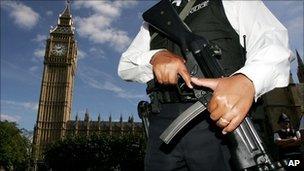Ministers plan emergency law to move terror suspects
- Published

Control orders were introduced under the former Labour government in 2005
Ministers have revealed draft emergency measures to relocate terror suspects months after pledging to scrap a similar power known as control orders.
Ministers have published a draft bill to use relocation or other restrictions in exceptional circumstances.
The power to move a suspect to a new home was ditched following a review by the coalition government.
Critics say the incoming Terrorism Prevention and Investigation Measures (TPims) are weak.
TPims are the proposed replacement for control orders restrictions which are due to be scrapped at the end of the year. The measures are used against suspects who have not been charged with an offence.
Ministers say the new system is a better balance between monitoring suspects and allowing them reasonable liberties. The bill before Parliament , externalremoves the home secretary's power to forcibly relocate a suspect.
Each man who has been relocated will be allowed to return home once control orders are replaced in January 2012.
However, the Home Office's draft 'enhanced' bill, external, to be held in reserve, would reintroduce relocation in exceptional circumstances.
A draft bill of stronger measures was always likely because the coalition's review of counter-terrorism laws, external concluded that there may be exceptional circumstances when additional powers would be needed to control suspects.
Documents published by the Home Office describe exceptional circumstances as a moment when "we are facing a terrorist threat that cannot be managed by any other means."
Other restrictions
The draft bill, if enacted, would give the home secretary the power to control the finances of a suspect and ban them from using mobile phones or computers - current control order powers. Curfews could extend to 16 hours.
Ministers have faced pressure from the opposition and other critics who have highlighted the case of a controlee, known only as CD, who will return to London once control orders lapse.
The man attended the same Lake District terrorism training camp as the 21/7 bombers - and was allegedly planning to acquire a firearm. The man has denied allegations of wrongdoing - but a judge has upheld the relocation order.
Labour MPs have been planning to try to reinsert the relocation power into the main TPim bill next week. Shadow Home Secretary Yvette Cooper accused the coalition of incompetence and a political fudge.
"After pressure from the police, the intelligence services and the Opposition, the government has finally admitted there is a problem with their plans to weaken counter terror legislation and remove the ability to relocate very dangerous terror suspects. The trouble is they are refusing to solve it.
"They could easily change their plans in the Commons on Monday, but instead they have produced confused and impractical emergency legislation that won't work for the serious cases we already face."
Imran Khan, a solicitor who represents men on control orders, said: "I'm flabbergasted at this. A few months ago the government said it was OK for people who had been relocated to go back to their homes. Now it's decided to bring internal exile back."
The Home Office said: "The Enhanced TPim Bill provides powers for the home secretary to impose enhanced TPim notices specifying more stringent restrictions than those available under the TPim Bill, if approved by Parliament.
"These include the power to relocate the individual without their consent to a different part of the country, geographical boundaries, and tighter restrictions on association and communications."
- Published26 January 2011
- Published26 January 2011
- Published26 January 2011